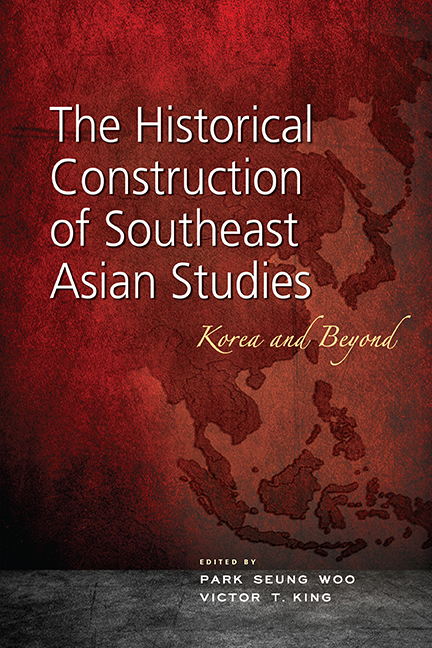Book contents
- Frontmatter
- Contents
- List of Tables
- List of Figures
- Foreword
- Acknowledgements
- About the Contributors
- 1 Introduction: The Historical Construction of Southeast Asian Studies and the Emergence of a Region
- PART I NORTHEAST ASIA
- 2 Southeast Asian Studies in China: Progress and Problems
- 3 Studies of Southeast Asian History in Contemporary Japan: The 1990s and 2000s
- 4 The Historical Construction of Southeast Asian Studies in Korea
- PART II SOUTHEAST ASIA
- PART III EUROPE
- PART IV AUSTRALIA AND THE U.S.
- Index
3 - Studies of Southeast Asian History in Contemporary Japan: The 1990s and 2000s
from PART I - NORTHEAST ASIA
Published online by Cambridge University Press: 21 October 2015
- Frontmatter
- Contents
- List of Tables
- List of Figures
- Foreword
- Acknowledgements
- About the Contributors
- 1 Introduction: The Historical Construction of Southeast Asian Studies and the Emergence of a Region
- PART I NORTHEAST ASIA
- 2 Southeast Asian Studies in China: Progress and Problems
- 3 Studies of Southeast Asian History in Contemporary Japan: The 1990s and 2000s
- 4 The Historical Construction of Southeast Asian Studies in Korea
- PART II SOUTHEAST ASIA
- PART III EUROPE
- PART IV AUSTRALIA AND THE U.S.
- Index
Summary
There are several complications in discussing the contribution of Japanese historians to the understanding of Southeast Asian history. The fact that Southeast Asia includes eleven countries, usually divided into mainland and maritime sub-regions, with different environments and histories makes it difficult to discuss an overarching research theme that can cover the entire region. Whilst countries in mainland Southeast Asia have existed as identifiable states from a relatively early stage in history, those constituting the maritime sub-region were created as states through Euro-American colonial occupation. A further complicating element has been the ethnic diversity within each country, which has generated significant tensions and in some cases open conflict. Finally, the difficulty in writing an essay on the contribution of Japanese scholars to Southeast Asian history is that Japan has the largest number of Southeast Asian history scholars in the world. The academic organization called Tonan ajia shigakkai [Japan Society for Southeast Asian History] represents the nation's fertile academic interest in this area.1 Japanese research has dealt with very detailed questions in each Southeast Asian country. Therefore, in many cases, it is difficult to determine the period of history and the country discussed in the literature just through a cursory look at the titles of the published works produced by Japanese historians.
The reason why so many Japanese scholars can actively engage in Southeast Asian historical research is because organizations such as the Nippon Foundation (which surpasses the United States’ Ford Foundation in terms of research grants and the funds available), the Ministry of Education and Science, and the Toyota Foundation provided generous financial support to promote humanities studies. Researchers can spend a year or two in any country or region he or she wishes and collect the most recent data and information (Shiraishi 2003, pp. 141–47).
Due to the massive number of researchers, tracking down each of the numerous research papers and periodicals generated from all the university research institutions and publishers is an extremely daunting task. Fortunately, it was possible to solve this problem by using the Tonan aija — rekishi to bunka [Southeast Asia: History and Culture], the academic journal of Tonan aija shigakkai, which provides the “Tonan aija kankei bunken mokuroku” [A list of publications on Southeast Asia] published in the previous year.
- Type
- Chapter
- Information
- The Historical Construction of Southeast Asian StudiesKorea and Beyond, pp. 73 - 111Publisher: ISEAS–Yusof Ishak InstitutePrint publication year: 2013



